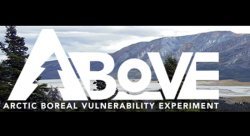Our proposal to NASA’s ABoVE program has been selected!
Changes in Shrub Abundance in Arctic Tundra from the Satellite High Resolution Record for the Arctic-Boreal Vulnerability Experiment and Impacts on Albedo
Posted in: Research

Project Lead
- Mark Chopping, Montclair State University
Collaborators
- Rocio Duchesne-Onoro, University of Wisconsin – Whitewater
- Crystal Schaaf, University of Massachusetts Boston
- Ken Tape, University of Alaska, Fairbanks
- Zhuosen Wang, NASA/GSFC
Period: 9/1/15 – 8/31/21
This NASA-sponsored project supports NASA’s ABoVE campaign. It will use semi-automated interpretation of high-resolution imagery acquired by Earth-orbiting satellites to assess the direction and magnitude of changes in shrub cover and aboveground biomass in Alaskan and Canadian Arctic tundra over a 10- to 15-year period. A wide range of NASA and commercial satellite imagery will be used (QuickBird, GeoEye. WorldView-3, MODIS, MISR and VIIRS).
The data generated will not only provide a more precise picture of rates of change in shrub abundance and how this impacts summer tundra albedo but will also have utility for other ABoVE remote sensing initiatives that use imagery acquired at lower spatial resolutions (aerial acquisitions, Landsat, MODIS, MISR, VIIRS); and for other tundra researchers.
A graduate student will be engaged at Montclair State University to work with the Principal Investigator on this project over two years. S/he will work on assessing imagery availability, locating sites, generating high resolution canopy maps and statistics from the application of the PI’s CANAPI algorithm with high resolution imagery, development of remote sensing products (with the PI); coordination with collaborators; evaluation of the accuracy and precision of results; and manuscript preparation (stipend+tuition provided over two years).
NASA’s Arctic-Boreal Vulnerability Experiment (ABoVE) Campaign (http://above.nasa.gov) will take place in Alaska and western Canada during the next five to eight years. ABoVE will seek a better understanding of the vulnerability and resilience of ecosystems and society to this changing environment, as climate change in the Arctic and Boreal region is unfolding faster than anywhere else on Earth, resulting in reduced Arctic sea ice, thawing of permafrost soils, decomposition of long-frozen organic matter, widespread changes to lakes, rivers, coastlines, and alterations of ecosystem structure and function.
